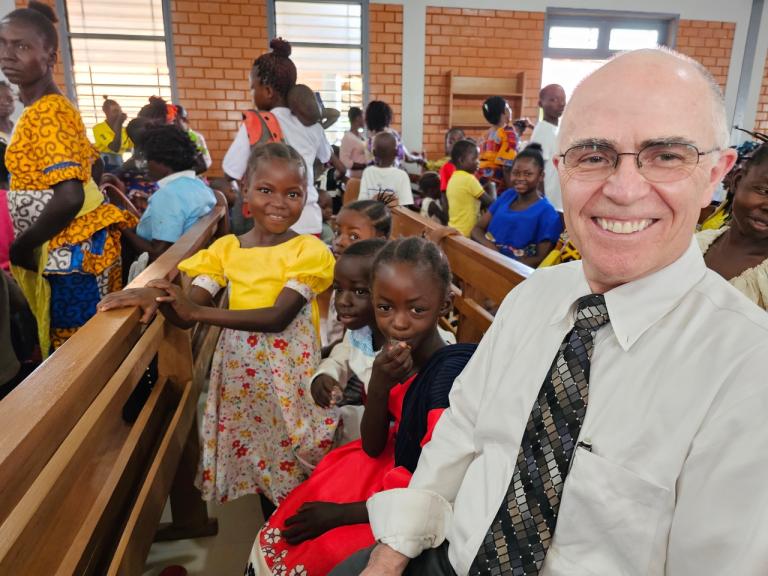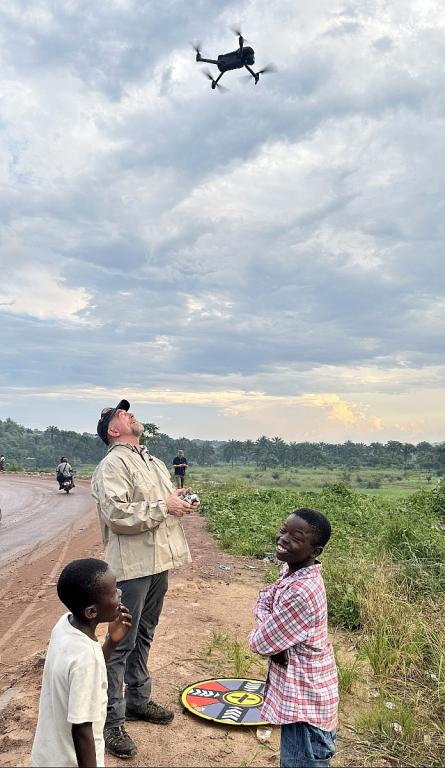If you have been paying any attention at all lately to "Sic et Non," you've likely noticed something very unusual. Namely, the blog proprietor has been posting a whole lot of pictures of Black people. In fact, these folks are residents of the Democratic Republic of the Congo (DRC), and it turns out the the Interpreter Foundation is involved in some kind of movie-making venture there. You would think that, with the financial failure of "Witnesses" at the box office, and with things apparently moving forward with the anti-Community of Christ Brigham Young biopic, that Interpreter would have enough on its plate. But no: something else is afoot.
"Sic et Non" explains things this way:
Why does his think this? He doesn't say. Instead, he goes on to plug the Church's temple-building efforts:DCP wrote:As you may have noticed, this post features photographs from the Interpreter Foundation’s ongoing film project in the Democratic Republic of the Congo. Conditions there are challenging, but our team appears to be having a very good experience. And the films that will eventually result should be of interest, I think, to more than a few Latter-day Saints who will never themselves go anywhere near the Congo.
(italicization ibid)A small temple already stands in Kinshasa, the capital city of the Democratic Republic of the Congo, the DRC. Ground has been broken for a second DRC temple in Lubumbashi, and a third DRC temple has been announced for Kananga. Moreover, a temple has also been announced for Brazzaville, the capital of the Republic of the Congo — which is a wholly distinct country from the DRC. Brazzaville is located on the northern side of the Congo River, directly opposite Kinshasa.
Question: What is the largest French-speaking city in the world? Answer: With somewhere between 12.5 and 17.1 million residents, Kinshasa is the largest French-speaking city in the world. It is followed by Paris and its immediate suburbs; the Paris metropolitan area has roughly eleven million inhabitants. But perhaps Brazzaville should be entered into the total, as well: The official language of the Republic of the Congo, of which Brazzaville is the capital, is French. Brazzaville’s population just under two million.
When the temples in Lubumbashi, Kananga, and Brazzaville are dedicated, along with nearly complete Abidjan Ivory Coast Temple (in the République de Côte d’Ivoire), there will be (by my count) seven Francophone temples in the world — including Paris, France, and Papeete, Tahiti, and five in Africa.
And he concludes with this somewhat cryptic remark:
Huh. What "contribution"? Will Interpreter be engaging in missionary efforts? Charitable work? Teaching gospel doctrine classes? Translating their "peer reviewed" articles into French, so that the Church members in DRC can read them? I mean: it's *possible* that they are interested in smear pieces on John Dehlin and Jonathan Neville, or that they might want to know more about how Mormon Transhumanism is vaguely "apostate."I hope you’ll agree with me that the story of the founding of the Church in Africa, and of its remarkable growth there, deserves to be known. The Interpreter Foundation can’t do it all, of course, and doesn’t pretend to be doing so. But we’re hoping to make a contribution.
Seriously, though: What is the Interpreter Foundation up to? A bit of further inquiry reveals that the whole enterprise is, in part, a "pet project" of Jeffrey Bradshaw, the Vice President of Special Projects, and someone who stirred up quite a bit of controversy last year after he "stole" large portions of material for his book so that he could beat his competitors to the market. Bradshaw's project, in fact, takes up a significant chunk of space at the Interpreter blog's website: it's called "The Church in the Democratic Republic of the Congo." (One wonders: Why isn't this called, "The Interpreter Foundation in the Democratic Republic of the Congo"? The way it's phrased creates the impression that this whole thing was a Church-funded, "official" effort.)
There are multiple entries here, and I admit that I have not read them all, but what's striking about them is how much they read like propaganda. Bradshaw sometimes includes details about the people's lives, but in every case, the people are used essentially as "props" to tell a faith-promoting story. Take a look at this, for example:
"an important national economic development mission"? Bradshaw is careful to specifically document all the LDS-related details of the couple's lives, but notice how vague and imprecise he is here when it comes to Da's career. In another entry, entitled, "Obey...With Exactness," Bradshaw discusses dowry customs in the region, and how these run contrary to the Church's rules:Da and Angélique went on to raise a faithful family of four children in Kinshasa, DR Congo, to whom they were sealed in the Johannesburg, South Africa temple. They have blessed many lives through their dedicated service to God and their neighbors. No longer a hunted enemy of the Liberian soldiers, Da recently served his country as an advisor for an important national economic development mission. As a capstone to that mission, he was hosted in August 2018 by the president and first lady of Liberia at an Independence Day reception in Monrovia.
Rather humorously, this comment is posted beneath an image of a news article that features the headline, "In Kenya, LDS President Nelson says tithing breaks poverty cycle." One wonders: do non-LDS family members in DRC take issue with the idea that they are not permitted to attend temple wedding ceremonies, similar to how things happen in the US? In any case, the story Bradshaw relates is rather heartbreaking. He describes a couple's courtship, and how the woman's uncles (her guardians, essentially) demanded a huge dowry, which the man couldn't afford. The woman gave them an ultimatum, though, and they relented, but said that "we will not organize a wedding reception. There won’t be a wedding reception.” Luckily, the Church members come through, delivering peanuts and beignets. Bradshaw wraps up the story with this:A persistent concern relating to marriage throughout Africa is the requirement of large marriage dowries — essentially a bride price. The Church teaches members that dowries are harmful and degrading to women, lead to couples postponing marriage and family, and handicap them financially as they are trying to make a start in life. Eliminating the practice is difficult because even if a member couple wants to do away with these traditions, extended family can exert great pressure on them to conform.
In another posting, entitled, "The Kinshasa DR Congo Temple: A Personal Perspective Part 5," Bradshaw relates the following story:Two years later, Thierry and Nathalie were sealed in the Johannesburg temple. Thierry said:In the spring of 2018, Thierry was released from his call as president of the Masina stake. That summer, he began service as the president of the Baltimore, Maryland mission.The lesson I learned … is that we need to focus on what is most important. And for me, the most important thing was my marriage to my wife.
Why, I cannot help but wonder, does Bradshaw opt to interrogate them about their temple recommend status? This could have been an occasion to reaffirm the young men's faith, no? And to celebrate the construction of the temple? Instead, we get what--in Bradshaw's own words--sounds more like a lecture.While there were many curious people from around the city who visited the Kinshasa Temple open house, the majority of the visitors were already members of the Church. Some were long-time members who had been eagerly anticipating a temple in Kinshasa for decades. Other, newer members, having lived thousands of miles from the nearest temple came to see and begin to understand the temple for the first time in their lives.
One day, as I was walking to our apartment building, I was hailed by two brothers I didn’t know. They said they had been active members of the Church for a long time — five years. They told me about their callings in their ward and how happy they were to see the temple here at last. I asked them whether they had seen their bishop yet for a temple recommend interview, and one of them replied, “What’s a temple recommend?” We had a wonderful conversation about the temple for the next five minutes, and both of them promised they would make an appointment to see their bishop on Sunday.
Still, to Bradshaw's credit, he tends to leave himself out of these postings--he relies on "oral histories" from the people in his blog entries. The photos on "Sic et Non," on the other hand, are striking in the way that leering white males are placed front and center:

And rather tellingly, DCP provides the following caption for this photo: "Jeff Bradshaw took this photo of James Jordan launching a camera drone. James calls this photo “Pied Piper.”:

I don't know about you, but I find much of this to be rather disturbing--if not outright distasteful. It seems clear that, first and foremost, the Interpreter is exploiting these people and their stories for the sake of propaganda and "faith-promoting stories." There are no signs whatsoever that Interpreter is doing any good out there: that they are providing meals, or building homes, or procuring clean water, or, heck, even teaching Church classes. Instead, they are fooling around with drones, "Pied Piper"-style, all apparently with the end goal of drawing in more donations to support their "projects."
Meanwhile, as others have already pointed out, Dr. Peterson noted that he was told by somebody in authority that he should "drop" a film project dealing with "lost saints" in the Congo. Is this latest Interpreter venture a means of "poking authority in the eye," so to speak? After all, Dr. Peterson is someone who tends to react very badly to being told that he can't do something.
At the end of the day, though, I can't help but turn to Wikipedia's helpful definition of "Colonialism," and this paragraph, which has been excerpted from Jürgen Osterhammel's Colonialism: A Theoretical Overview:
It's remarkable how snugly the shoe fits in this case. The Church itself, as an institution, has always had colonialist ambitions, but now it would seem that the Interpreter Foundation is following suit. Suffice it to say, though, exploiting people in a 3rd world country for the sake of soliciting more donations for your Mopologetic non-profit is distasteful at best, and connivingly racist at worst.Colonialism is a relationship between an indigenous (or forcibly imported) majority and a minority of foreign invaders. The fundamental decisions affecting the lives of the colonised people are made and implemented by the colonial rulers in pursuit of interests that are often defined in a distant metropolis. Rejecting cultural compromises with the colonised population, the colonisers are convinced of their own superiority and their ordained mandate to rule.
It will be interesting to see how this develops, but for the time being, I cannot help but be reminded of the fact that the Interpreter leadership keeps company with Roberty Boylan, Mike Parker, and the rest of the Mopologists who thought it would be funny to invent and hide behind a made-up African American apologist named "Richard Nygren." The Mopologists, I think, are treading on some exceptionally thin ice at the moment.
